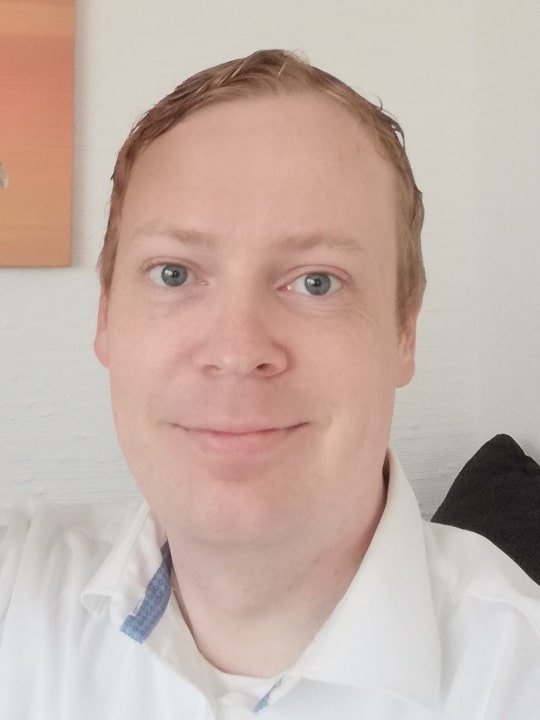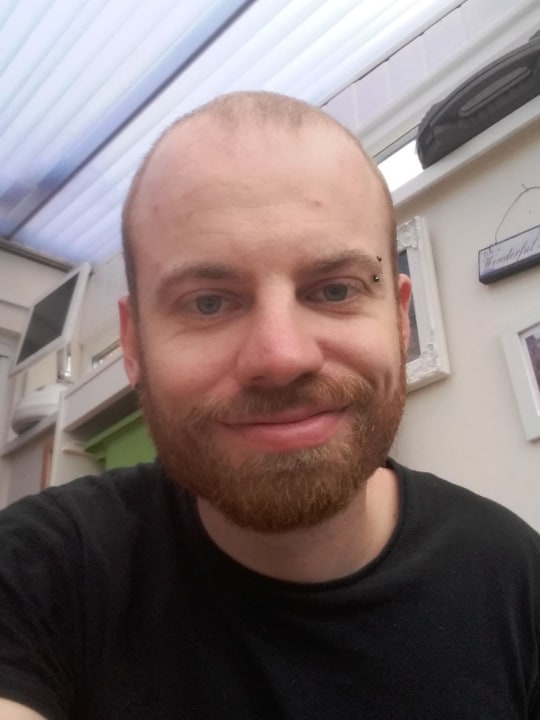Human sexuality begins to emerge at an early age. Our gender identity takes form and we become involved in complex dynamics, at first with our parents, and later with society in general.
Watch a Short Excerpt:
Transcript (continued):
William: Okay. Let's get back to the story about the development of, again, a little boy first of all. I don't know if this applies one-to-one to little girls. I have read that there is a complex on the flipside. I don't remember the name of it. Some woman in some mythical story probably again who fell in love with her father. I can't remember the name. But there is a theory that the same exists for the other side. I'm just not as familiar with it, and I don't know if it would really be the same mirrored, or if there would be other parts to that situation. But a boy is attracted to his mother at the age of 2 or 3, and he realizes that she doesn't feel the same way about him. He feels like the father gets in the way. Right? So he's jealous of him. So he is in a fight with the father. And this is mainly in his mind, right?
Steven: Yeah. Sorry to interrupt again, but does the theory say it's sexual or does it say it's emotional?
William: I think both.
Steven: Okay.
William: Or is this different from what you've heard?
Steven: I don't know much about biology, but it just seems like the term "sexual" seems very strange to be used as children if you don't have a sexual... you don't have an actual sexual impulse.
William: I see. Because you haven't been through puberty?
Steven: Yeah.
William: I guess that's a different level than what adults or, you know, teenagers go through.
Steven: There is a bond there obviously between a parent and a child. But to use the term "sexual" seems very dark and strange.
William: Right. It's not like the boy knows about sexual activity and that's what he wants. It's just he feels naturally drawn to his mother, and not just any woman, but just his mother in the beginning.
Steven: "Maternal" for a better word, it's maternal attraction.
William: Sure, yeah. So, she is the representative of womanhood for him at that state, and the father of manhood. He realizes that they're a couple. He cannot get to his mother because she seems to always go to his father to be close. This this doesn't mean that he observes them having sex. Just them being happy together, or maybe kissing. I don't how aware he is of those things. But there is definitely a triangle dynamic going on. And so he is conflicted because he needs the support of his father. He realizes that he's dependent on his parents. You know, his father takes the role of kind of defending the family from outside dangers. But at the same time he wants to be close to the mother and has a problem with the father being there, being the partner of the mother. And so he's kind of in a competition. And obviously he cannot physically fight the father. That's not how it works, how it turns out. But the fight goes on in his mind mainly. And he is trying to figure out what to do about the situation. It would be nice if he could just wish for the father to be gone. I mean that's probably what he does anyway, just wishes him to be gone. But if that doesn't happen then he has to come up with another strategy. But he realizes he can't do anything to get the mother for himself.
Steven: I mean, you would know if the child would, because you'd know through screaming or crying. A child is biologically programmed to survive. And if there is a threat, the threat being the other parent, then... to the attention that it wants, because survival is also at that stage the happiness thing. So what makes me happy? Being with mommy or being with daddy or whatever. And then that's part of his survival programming. Then yes, he threatens that. Children are so good at manipulating parents. It's uncanny what they can do and say to play the parents off each other, to throw tantrums that gets the attention of one parent.
William: That's a good point. They don't even know they're doing it. They just act on instinct, right?
Steven: Yeah.
William: So what happens next? If everything turns out well, you know, in a healthy sexual development, the boy will realize that he cannot have the mother for himself, and he will distance himself, I want to say, emotionally, but not in every sense emotionally, because there's still a bond there, the one that you end up having in the end with your mother, you know, a source of support and understanding, but not a sexual connection. So he kind of gives up on that, and then basically starts looking elsewhere for a female mate, but, again, not in the sense as a teenager or an adult, but just being open to other women, and no longer being so focused with that one woman that he started out with. And a lot of things can go wrong in this. It's not called a complex for nothing. And whatever does happen for that boy can have consequences for the rest of his life. I don't know if it's the same for girls.
Steven: It would be very similar.
William: I imagine they make connections to their parents as well.
Steven: It'll be... as children we don't really have an identity as such. So whether you're boy or girl, you're still more of a child. You may be biologically different, but you don't have the later-on-in-life impulses or whatever or situation. So you're just a blank slate. Therefore I think there will be very similar... We talk about girls with daddy issues. That's a phrase that's thrown around obviously a lot. Or boys with mommy issues.
William: That could mean several things. It's not one phenomenon. But you're right. The girls' connection to their fathers can be just as complex. It is just as important for their sexual development.
Steven: Yes, because how your parents treat each other is very much another thing from the get-go, from when you're born. How they treat each other is how you're learning to eventually treat those that you will be partnered with.
William: Just yesterday as I was walking through town I saw a guy with his wife, girlfriend, I don't know. They had a little girl, probably the daughter, walking in for them. And he was kind of in a macho stance. Or the way he held himself looked a bit macho, you know how they like to be a bit wide. I don't know how to describe it.
Steven: Pumped chest.
William: Yeah, that's part of it, and a gold chain around his neck. And the the girlfriend being more, you know, subtle or passive, and he being dominant. And also the way he spoke to his daughter sounded macho. And then when I listened to a bit of what he was saying, I didn't understand what he said... But I understood that it was Russian or something close to Russian. And I thought "wow, this is exactly like the image I get from the media about Russian husbands and fathers." How is it possible that this kind of behavior can be associated with an entire country? I guess a big part of it is that it gets passed on from generation to generation. A boy watches his parents, how his father, in this case, makes demands and how the mother just goes along with it. And so he dominates, and she just has to do what he says. She seems to be dependent on him. And then we act it out as though it were a blueprint for the rest of our lives.
Steven: Yeah. One big cultural norm, if that counts as a norm, is shown on media. It's always just potentially a majority, potentially, not always. So they got, you know, a lot of Eastern European and Russian culture still very much the traditional masculine male, feminine female, timid, aggressive... contrasts, where in Western culture... I'm not saying... well actually I am saying that one's better, because actually... I very rarely do this, put a yeah or nay on it, but there's no reason for either partner to be domineering or aggressive towards the other, you know. That diminishes.
William: I agree. I think it's progress when someone doesn't hurt the other one just because they fill a certain role.
Steven: Yeah, there's no need for emotional suppression in terms of domineering that woman or man... can't say what they feel or think because it's not appropriate to their role. It's just nonsense, absolute nonsense.
William: I think none of this happens out of spite or just trying to force the situation into being conducive to the blueprint that we watched when we were young. I think it's just an automatic thing.
Steven: It's a leftover evolutionary trait that just we can't seem to shake. The male being is more physical, so therefore can go to the hunting gathering in general.
William: Right, there is definitely a biological origin for that. I think it's not arbitrary. But even in a person's life span will a person ever become conscious of his programming and be in charge of it to consciously make decisions about what role he wants to fulfill? I don't know. I guess for some people that it will happen, but probably only later on in life, maybe in their 40s the soonest. Because it's just so ingrained in us.
Steven: It takes a dramatic situation. As you say, for most people it'll probably be again in their late 30s, 40s even beyond that they have a sort crisis that the they go through a "Who am I?" process. Because they are now half way beyond their life expectancy, that tends to be the trigger, the whole midlife crisis thing.
William: So they reevaluate.
Steven: And it causes a lot of trauma, causes a lot of difficulties. They don't know what to do themselves. They go out and do crazy things, impulsive things. Then they may just go back to original behavior, how they were beforehand. Or they may have progressed and decided to change a few things. But that change is painful, that change is difficult. That change requires, as we talked about before, a certain amount of humility and modesty to admit you're wrong. Technically it's not your fault that you're wrong. That's the thing. People people don't want to admit it because they feel like they have to blame themselves and feel guilty. That's nonsense. You just go "Okay, that's the way it was. We found a better way or a way that looks like it's, I guess, increased happiness." That's ultimately what we should be striving for.
William: Yeah. We want to harmonize with each other. We want conflicts to disappear, not by suppressing them, but by understanding them, and then accepting our situation and trying to work it out.
Other Episodes:
Ep. 51: How Conditioned Are We ?
How much of what you do, think and feel comes from intentional, free chosing? How much of your actions and decisions are pre-programmed? You are the product of your upbringing, culture and genetics. What is out of our control? What can we influence? How can we counteract our predestination?
Ep. 50: What Am I Responsible For ?
Are you taking too little responsibility for your actions, or perhaps too much? How much are you able to understand or determine the consequences of your decisions? Are you in control of anything? Is free will an illusion? Can you do something to improve your thoughts, feelings and relationships with...
Ep. 49: Empathy Can Be A Super Power
Everyone has the choice of either living isolated from other people and their own feelings on the one hand, or to connect with others and their own emotional core. The road towards connectedness involves vulberability and weakness. But it leads to a very rewarding ability that includes deeper understanding of...
Ep. 48: Why Am I Ashamed?
What secrets do you have? What facts about you must never become known to others? What happens in our childhood that implants beliefs in us that hide away for the rest of our life? Can we uncover them deliberately? Can we regain the emotional freedom and levity that playing children...







